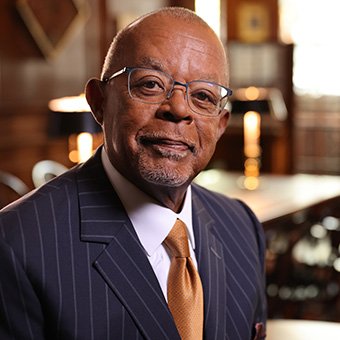
Professor Henry Louis Gates, Jr.
Henry Louis Gates, Jr. is the Alphonse Fletcher University Professor and Director of the Hutchins Center for African & African American Research at Harvard University. Emmy, DuPont, and Peabody Award-winning filmmaker, literary scholar, cultural critic, and institution builder, Professor Gates has published numerous books and produced and hosted an array of documentary films, including The Black Church (PBS), Frederick Douglass: In Five Speeches (HBO), Gospel (PBS), and Great Migrations (PBS). Finding Your Roots, Gates’s groundbreaking genealogy and genetics series, now in its eleventh season on PBS, was nominated for a Primetime Emmy (2024). His latest book is The Black Box: Writing the Race (Penguin Random House, 2024), named by The New York Sunday Times Book Review as one the “100 Best Books of the Year.” He is at work on a new series exploring “The History of Blacks and Jews.”
Gates is a recipient of numerous honorary degrees, including most recently, one from his graduate alma mater, the University of Cambridge, and The London School of Economics. Gates was a member of the first class awarded “genius grants” by the MacArthur Foundation in 1981, and in 1998 he became the first African American scholar to be awarded the National Humanities Medal, conferred by President William Jefferson Clinton. In 2001 he discovered the first novel written by a Black female author, The Bondwoman’s Narrative, by Hannah Craft, the holograph manuscript of which he donated to Yale’s Beinecke Rare Book Library.
A native of Piedmont, West Virginia, Gates earned his B.A. in History, summa cum laude, from Yale University in 1973, and his M.A. and Ph.D. in English Language and Literature from Clare College, Cambridge, in 1979, where he is an Honorary Fellow. A former chair of the Pulitzer Prize board, he is a member of the American Academy of Arts and Letters and serves on a wide array of boards, including the New York Public Library, the NAACP Legal Defense Fund, the Aspen Institute, the Whitney Museum of American Art, Library of America, and The Studio Museum of Harlem. In 2011, his portrait, by Yuqi Wang, was hung in the National Portrait Gallery in Washington, D.C. In 2023, his portrait, by Kerry James Marshall, was hung at the Fitzwilliam Museum at The University of Cambridge. He was inducted into the Phi Beta Kappa honor society in his junior year. In July 2024, he was awarded the prestigious Spingarn Medal from the NAACP. In December 2024, he was awarded The Barry Prize and was elected an Honorary Fellow by the Royal Academy of Arts in England. In February 2025, he was awarded the Vilcek Prize for Excellence in Literary Scholarship.
